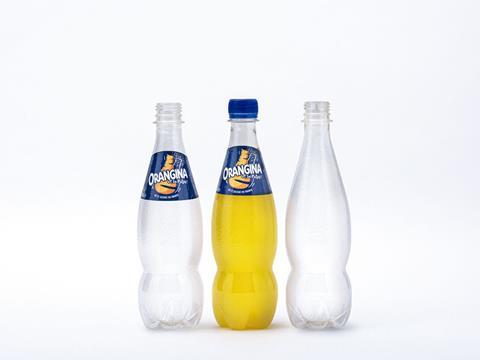
Suntory Group has today announced a prototype PET bottle made from 100% plant-based materials, which will be used for the company’s Orangina brand in Europe and Suntory Tennensui mineral water brand in Japan.
Suntory has worked closely with Annelotech, a US-based sustainable technology company, for almost a decade to create the prototype. A new technology from Annelotech reportedly allows plant-based paraxylene derived from woodchip to be converted into plant-based terephthalic acid (PTA), a raw material typically making up 70% of PET’s material composition.
This is combined with Annelotech’s plant-based mono ethylene glycol (MEG) made of molasses, which makes up the remaining 30% of PET. Suntory says it has been using plant-based MEG in its Suntory Tennensui brand in Japan since 2013.
Tsunehiko Yokoi, executive officer at Suntory MONOZUKURI Expert Ltd, explains: “The significance of this technology is that the PTA is produced from non-food biomass to avoid competition with the food chain, while MEG is also derived from non-food grade feedstock.”
David Sudolsky, president and CEO of Annelotechm, adds: “The competitive advantage of Anellotech’s Bio-TCat generated paraxylene is its process efficiency (it uses a single-step thermal catalytic process by going directly from biomass to aromatics: benzene, toluene and xylene), as well as the opportunity it creates for a significant reduction in greenhouse gas emissions as compared to its identical fossil-derived paraxylene in the manufacture of PET especially as it generates required process energy from the biomass feedstock itself.”
Suntory adds that this potential reduction in greenhouse gas emissions is an important stride in its goal to reach net zero emissions by 2050 across its whole value chain.
Additionally, the plant-based bottle is allegedly fully recyclable in existing recycling streams alongside fossil-based PET. Suntory is aiming to develop a circular solution wherein its recyclable bottles can, in turn, be made back into recyclable bottles.
According to Michelle Norman, director of sustainability and external affairs at Suntory Beverage & Food Europe: “Bringing plant-based plastics into the supply chain solves a major challenge for drinks companies.
“Due to the low availability of recycled plastic across Europe innovation like this will ensure that the demand for our much-loved drinks can be met in a sustainable way for future generations to come.”
Suntory is aiming to commercialise the 100% plant-based bottle as soon as possible, as part of its goal to develop a fully sustainable PET bottle by 2030.
Vincent Meron, research and development director at SBFE, comments: “In the future we will integrate this new bio plastic with plastic made from post-consumer waste. This will enable us to move away from plastic bottles made from fossil fuel, which also supports our green-house gas emissions reduction activity.”
In 2019, Suntory announced that it would partner with Carbios to scale and commercialised its patented PET-enhanced recycling technology. Carbios has since opened an industrial demonstration plant as part of its development of its proprietary enzymatic recycling process, which was used to launch Suntory’s enzymatically recycled Orangina bottle earlier this year – a world first, according to the company.
Other sustainability initiatives from the company include a new bottle for its Ribena brand, made from 100% recycled material and a reduced sleeve to aid separation for recyclability. While Ribena bottles have been recyclable for some time, and apparently used recycled materials since 2007, the sleeve’s dark colour had previously inhibited sensors at some recycling plants from identifying the clear, recyclable bottle itself.
Notably, Suntory’s most recent development with its Orangina and Suntory Tennensui brands places it alongside other companies including Coca-Cola, PepsiCo, and Absolut to fully commercialise an effective plant-based bottle.
Coca-Cola’s bottle is also based on plant-based MEG, derived from feedstock such as hardwood from sawmill side-streams to avoid raw materials that could be used as food. Like Suntory, the company claims that its plant-based bottle can be recycled bottle-to-bottle within existing recycling infrastructures, and expects the core bMEG component to be available commercially in 2023.
However, polymer engineer and materials science specialist Mario Grimau highlights that bio-based plastics can come with a slightly higher cost than fossil-based plastics, while the share of bioplastics in the global production of industrial plastics is much lower than is currently needed.
In addition, Grimau emphasises that it is incredibly difficult to fully quantify the environmental impact of plant-based bottles, especially in relation to fossil-based PET – which could well mean it is too soon to predict whether plant-based bottles will actually be beneficial to the environment as recycling technologies continue to develop and many of these prototypes are only first-generation.
Meanwhile, other technologies such as Pulpex and Paboco’s paper-based bottles, while used by companies including The Estée Lauder Companies and Coca-Cola respectively, are also in the very early stages of development. Absolut’s fibre-based bottle is a first-generation version using Paboco’s technology, and currently is made from 57% paper with plastic in the mouthpiece and barrier inside the bottle.
It remains to be seen how the race to commercialise plant-based bottles will play out, but Suntory’s latest announcement demonstrates the continuing expansion of innovation in the bioplastics segment as a whole.












